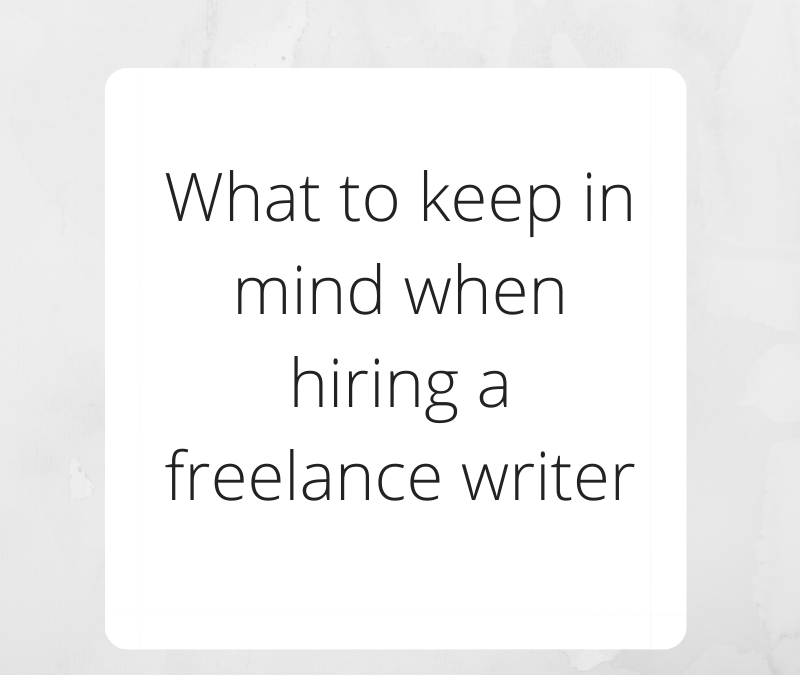It’s no secret that building—and especially growing—a blog can be a huge challenge. It’s true that the more you post the faster it’s likely to grow, but that’s a lot for one person to handle without getting burned out.
Many entrepreneurs tend to put their blog on the back burner because they either lack the time, run out of ideas, or simply hate blogging.
So what’s a busy business owner to do? Save yourself the stress and outsource your content writing.
You probably already know that hiring a freelance writer can make a huge difference, both in time savings and the quality of your content, but the whole process can seem so overwhelming.
I hear you, boss! Here are 5 things to keep in mind when hiring a freelance writer.

1. Understand what you need
First things first: You need to know what type of writer you’re looking for. Often “content writing” and “copywriting” are used interchangeably, but they’re not the same thing.
Content writers create compelling stories for blogs and articles. They often optimize content for SEO as part of your overall content strategy.
If you don’t have a marketing strategy for your content, then you may want to shift your focus from a content writer to a content strategist. A content strategist will help you nail down your target audience and their demographics. They can help with your competitor analysis and provide scheduling guidance.
Oh, and as a bonus, many content strategists will write your content, too. 🙂
A copywriter, on the other hand, writes sales copy for your email marketing campaigns or your landing pages. The goal of this style of writing is to increase your conversion rates with short, snappy content.
Both content writing and copywriting are necessary for a successful business. You’ll go through the same process for hiring a freelance writer, but I’ll focus on how to find a content writer in this guide.

2. Know your budget before hiring a freelance writer
You need to be realistic about what you can afford, but also keep in mind that a freelance writer can make a huge difference in your business. It’s better to look at this as an upfront investment instead of a holy-crap expense.
As the old adage goes, “You get what you pay for.”
There’s more value in hiring a freelance writer beyond just churning out blog posts—assuming you hire the right one.
Bad content will stick out like a sore thumb, especially if you’ve been writing your own blog posts up until this point. If you hire a quality writer or content strategist, not only will their writing fit seamlessly into your style and brand, but you’ll also see a return on your investment more quickly.
You don’t want to break the bank, but you also want to make sure you’re not throwing your money at the lowest bidder.
When in doubt, get a handful of quotes from different freelance writers. Compare their:
- Experience / portfolio
- Value for money
- Pricing
… against each other to see which writer works for you. It’s okay to pay a little more for a high-quality freelancer, especially if they’re including valuable add-ons that other writers don’t offer, like meta descriptions or image sourcing.

3. How to find talent
Okay, you’ve figured out what you need and your budget. Now let’s start the search!
The best place to find quality talent is through your friends, family, colleagues, and other local businesses. Recommendations from people you know are incredibly valuable, and they can provide a better understanding of who you’re hiring.
If that doesn’t work for you, no worries. You might not have any references to start with, and that’s okay. There are plenty of other places you can find quality talent without too much effort:
- Read through the articles posted on websites like HuffPost and Medium. If you see someone you like, reach out to them to ask if they’re looking for work.
- LinkedIn is a great resource for finding top-quality candidates.
- You can always check out some of the online freelance marketplaces like Upwork and Fiverr. Just be aware: you will likely get inundated with people pitching their services, and not all of them will be the high-quality writers you’re looking for.
There are many options for finding talent these days. It’s not hard to find people, it’s hard to find the right people when hiring a freelance writer.

4. Choosing the right candidate
You may have quite a few potential candidates to choose from—especially if you decided to post an ad online.
The first thing to do is narrow down the number of applicants for an interview. Start by evaluating the quality of their pitch—was it generic, or did they put some thought into it? Does it have spelling or grammatical mistakes? Did they provide relevant content examples?
Google is your friend here. Check out their website and blog to make sure you like the tone and style of their writing. Do they consistently offer value, or does it feel like they’re just trying to fill the page?
Some think that a freelance writer should have experience in their industry, but that’s not necessarily the case. After all, if you’re in a really niche industry, you probably won’t find a ton of experienced writers. Don’t limit your choices. A good writer will know how to research and provide relevant content, regardless of their expertise. Find someone who does a badass job at research.
Once you’ve whittled it down to just a few qualified candidates, it’s time for the interview. If you’re really struggling to decide between two or three writers, you can have them write a (paid) test piece so you can make sure they are able to match your brand.
And don’t underestimate the importance of hiring someone that you actually enjoy working with. If your personalities clash, your relationship won’t last very long.

5. Moving forward with hiring a freelance writer
Congratulations! You’ve sifted through all your potential candidates and have found your dream writer. The contract is signed, and you’re ready to rock.
Such a weight off your shoulders, isn’t it?
Now it’s time to focus on how to work alongside your new team member, and for this, communication is key. Be sure to provide feedback that’s consistent and easy to understand.
Remember that you’ve chosen to outsource your writing, and this means letting go of the reigns. I know it’s hard trusting your brand to an outsider. But trust your writers to execute. This can be a wonderfully collaborative relationship that will benefit both you and your business for months, even years, to come.

